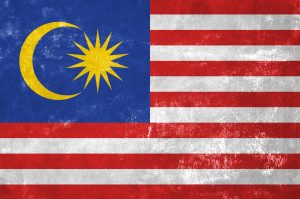Daim Zainuddin, a former Malaysian finance minister and key ally of former Prime Minister Mahathir Mohamad, died this morning at a hospital in Petaling Jaya, Malaysian media reported. He was 86.
Daim’s lawyer Gurdial Singh Nijar confirmed to Malaysian media outlets that his client, who was the subject of an ongoing corruption trial, died this morning after a long period of illness. “In the past few weeks, he was in ICU after he had a stroke,” he told Reuters. The lawyer did not know the exact cause of death, but Daim has suffered for years from a host of ailments that have kept him confined to a wheelchair and largely out of public sight.
Daim played a central role during much of Mahathir’s first stint in power between 1981 and 2003. He served as finance minister during 1984-1991 and 1998-2001, and as treasurer of Mahathir’s United Malays National Organization (UMNO) from 1984 to 2001, in which capacities he did much to shape the direction of Malaysian economic policy. He also served as a member of Parliament for five terms between 1982 and 2004.
Born in 1938, the lawyer-turned-businessman grew up close to Mahathir in Alor Setar, the capital of Kedah State, and the pair “enjoyed a friendship that contributed to the image and tone of the Mahathir administration,” as the late Barry Wain of the Asian Wall Street Journal wrote in his 2009 biography of Mahathir.
Michael Vatikiotis, a former correspondent for the Far Eastern Economic Review who interviewed Daim on several occasions in the 1990s, described him as “the principal mastermind behind UMNO’s corporate empire, using a coterie of loyal corporate executives to build a tangled web of holdings in key areas of the economy through complex share swaps and reverse takeovers.”
One of his major innovations was to leverage the New Economic Policy (NEP), an affirmative action policy that was introduced in 1971 in order to aid indigenous bumiputeras, in practice mainly ethnic Malays, and close the economic gap between ethnic Chinese and “indigenous” Malaysians. The NEP gave Daim the power to force ethnic Chinese businesses to divest holdings to bumiputeras, invariably those closely connected to UMNO and its upper echelons of leaders.
Daim also allegedly benefited handsomely from his position in UMNO’s financial backrooms. During the Mahathir administration, he “made it clear he was not going to let conventional notions of conflict of interest interfere with the way he ran his private business empire, the economy, or UMNO’s financial affairs. They became deeply entangled.”
Daim has been the subject of investigations by the Malaysian Anti-Corruption Commission (MACC) since Prime Minister Anwar Ibrahim, who was imprisoned under Mahathir, came to office in late 2022. In May 2023, MACC opened an investigation into Daim’s “alleged embezzlement of state funds amounting to an estimated RM2.3 billion” ($500 million) in 1997.
In a separate case, Daim in January pleaded not guilty to charges of failing to disclose millions of dollars worth of assets, including 38 companies, several luxury cars, and 25 properties in Kuala Lumpur, Negri Sembilan, Pahang, and Perak. The allegations were linked to reports published by the news outlet Malaysiakini as part of the 2021 Pandora Papers investigation. The reports claimed that Daim and his family, including his sons Amin and Amir and his wife Na’ima Khalid, were linked to shell companies and other offshore holdings that controlled assets worth tens of millions of dollars. Daim denied all of the allegations.
The cases against Daim were part of a series of MACC investigations of Mahathir-era figures, including Mahathir’s sons Mirzan and Mokhzani. These have been interpreted by some observers as a form of revenge on the part of Prime Minister Anwar Ibrahim, a former protégée of Mahathir, now 99, who spent five years in prison on politically motivated charges.
Whatever their motivation, the proceedings against Daim ground to a halt as his health condition worsened. Last month, Daim was unable to attend a scheduled court hearing concerning his mental fitness for trial, after being admitted to hospital.

































